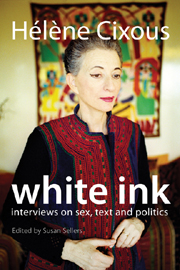Book contents
- Frontmatter
- Contents
- Acknowledgements
- Editor's note
- Preface: On being interviewed
- Part I Writing the enigma
- Part II Writing the feminine
- Part III Writing and politics
- Part IV Writing and theatre
- Part V Writing roots
- 10 Language is the only refuge
- 11 Being a Jewish woman is the ideal place
- Part VI On painting, music and nature
- Part VII Dialogues
- Envoi: But the Earth still turns, and not as badly as all that
- Bibliography of Hélène Cixous's works
- Index
10 - Language is the only refuge
from Part V - Writing roots
- Frontmatter
- Contents
- Acknowledgements
- Editor's note
- Preface: On being interviewed
- Part I Writing the enigma
- Part II Writing the feminine
- Part III Writing and politics
- Part IV Writing and theatre
- Part V Writing roots
- 10 Language is the only refuge
- 11 Being a Jewish woman is the ideal place
- Part VI On painting, music and nature
- Part VII Dialogues
- Envoi: But the Earth still turns, and not as badly as all that
- Bibliography of Hélène Cixous's works
- Index
Summary
This interview appeared as “La Langue est le seul refuge”, in La Quinzaine Littéraire793 (1–15 October), 10–12, 2000.
bl I would like to start with a multi-sided question, and let you choose on which you would like to settle. After reading Le Jour où je n'étais pas là, I initially thought of the purloined letter, or the hidden letter, and then of the hidden self, including you yourself, in all your books. For example, I am reminded of that recurrent wordplay on “pregsaintcy” in your previous texts, and if I may say so, since that is what you call the dead child, the saintly finds a place in this book. Or again, I think of those extraordinary pages in which you evoke a complex relationship with your nose, making the most tragic moments in History spring forth from the most personal of stories, all without losing for a moment the constant slippage which carries “a nose borne” into “born”, to “an un-born”, to this “inexact child” — when I remember that twenty-five years ago you published a book entitled La Jeune Née…
cixous That is immense … I'm going to start with the most straightforward, if I may call it that: with the perspective of personal history and what is called History. I have always had that perspective. No matter from how far I have viewed myself, I have always seen myself in this double scene — the most personal scene and the scene that is the most universal, historic.
- Type
- Chapter
- Information
- White InkInterviews on Sex, Text and Politics, pp. 127 - 134Publisher: Acumen PublishingPrint publication year: 2008

